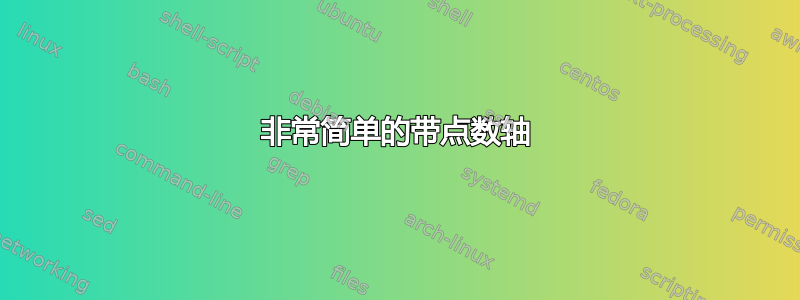
第一次使用 LaTeX。我读了这里的一些问题,但我仍然感到困惑。
我想要做的就是在 -3 和 3 之间画一条简单的数轴,并绘制一些点,比如 0.5、0.7 和 0.9。
我怎么做?
答案1
你是指类似
\documentclass[border=2pt]{standalone}
\usepackage{pgfplots}
\begin{document}
\begin{tikzpicture}
\begin{axis}[
% center the x axis
axis x line=middle,
% we don't need a y axis line ...
axis y line=none,
% ... and thus there is no need for much `height' of the axis
height=50pt,
% but `height' also changes `width' which is restored here
width=\axisdefaultwidth,
xmin=-3,
xmax=3,
]
\addplot coordinates {
(0.5,0) (0.7,0) (0.9,0)
};
\end{axis}
\end{tikzpicture}
\end{document}
答案2
一个纯粹的tikz替代方案:
\documentclass[tikz,border=3mm]{standalone}
\begin{document}
\begin{tikzpicture}
\draw (-3,0) -- (3,0);
\foreach \i in {-3,-2,...,3} % numbers on line
\draw (\i,0.1) -- + (0,-0.2) node[below] {$\i$}; % tick and their labels
\foreach \i in {0.5, 0.7, 0.9}% points on line
\fill[red] (\i,0) circle (0.6 mm);
\end{tikzpicture}
\end{document}
答案3
这是我之前做的一个改编版。代码旨在支持各种选项,因此在这种情况下,并非所有代码都必然要绘制简单的线条。事实上,还添加了其他选项来关闭其中一些功能。
这使得序言有点复杂,但如果你喜欢这种东西,它可能会很有用。然而,实际数字线的代码并不特别复杂。
\NumberLine*[
dot=blue,% colour of dots marking points on the line
dot opacity=.75,% opacity of dots
fraction=1,% we're only marking whole numbers
ticks above=false,% we only want standard axis marks below
min=-3,% start from here - max is 3 by default
number to=none,% we don't want to visualise a number as drawn along a fraction of the line
h scale=3,% scale the line a bit as the marks are too close otherwise
mark at={0.5,0.7,0.9},% points we want to mark on the line
]
\documentclass[tikz,border=10pt,multi]{standalone}
\usepackage{xparse}
\makeatletter
\newif\ifnl@mixednumbers
\newif\ifnl@ticksabove
\newif\ifnl@isnumberto
\tikzset{% http://tex.stackexchange.com/a/159856/ - Claudio Fiandrino
number line/.code={
\tikzset{
/number line/.cd,%
#1
}
},
/number line/.cd,
dot/.store in=\nl@dot,
dot opacity/.store in=\nl@dotopacity,
fill/.store in=\nl@fill,
fraction/.store in=\nl@fraction,
h scale/.store in=\nl@hscale,
line height/.store in=\nl@lineht,
line above/.store in=\nl@lineabove,
line below/.store in=\nl@linebelow,
mark at/.store in=\nl@markat,
max/.store in=\nl@max,
min/.store in=\nl@min,
mixed numbers/.is if=nl@mixednumbers,
mixed numbers/.default=true,
number to/.store in=\nl@numberto,
number from/.store in=\nl@numberfrom,
ticks above/.is if=nl@ticksabove,
ticks above/.default=true,
v scale/.store in=\nl@vscale,
fraction=4,
v scale=1.2,
h scale=4,
max=3,
min=0,
number to={7/4},
number from=0,
mixed numbers=false,
fill=orange,
dot=green,
dot opacity=.75,
ticks above,
mark at=,
line height=0.2,
line above=0.2,
line below=0.2,
}
\newcommand*\tnl{% modified from ref: WeCanLearnAnything at http://tex.stackexchange.com/questions/267921/macro-for-mixed-numbers-on-number-line-tikz (but I doubt this is the original source)
\begin{scope}[xscale=\nl@hscale,yscale=\nl@vscale]
\edef\tempa{none}%
\edef\tempb{\nl@numberto}%
\ifx\tempa\tempb
\nl@isnumbertofalse
\else\nl@isnumbertotrue
\filldraw[\nl@fill] (\nl@numberfrom,0) rectangle (\nl@numberto,\nl@lineht);% shaded portion of number line
\fi
\draw
(\nl@min,0)--(\nl@max,0)% lower part of x-axis
(\nl@min,\nl@lineht)--(\nl@max,\nl@lineht);% higher part of x-axis
\foreach \x in {\nl@min,...,\nl@max}
\node [anchor=mid] at (\x,-0.5) {\x};% whole numbers underneath number line
\pgfmathsetmacro\nl@maxfrac{int(\nl@max*\nl@fraction)}
\pgfmathsetmacro\nl@minfrac{int(\nl@min*\nl@fraction)}
\foreach \x in {\nl@minfrac,...,\nl@maxfrac}% fractional tick marks and numbers above number line
{%
\draw (\x/\nl@fraction,-\nl@linebelow)--(\x/\nl@fraction,\nl@lineht);
\ifnl@ticksabove
\node[above] at (\x/\nl@fraction,{\nl@lineht+0.05}) {$\frac{\x}{\nl@fraction}$}; % draw tick and mark fraction above line
\fi
\ifnl@mixednumbers
\pgfmathsetmacro\intbit{int(\x/\nl@fraction)}% integer bit
\pgfmathsetmacro\fracbit{int(\x-\nl@fraction*\intbit)}% proper fraction bit
\ifnum\intbit=0\let\intbit\relax\fi % don't print 0 in mixed numbers
\ifnum\fracbit=0\else
\node [anchor=mid] at (\x/\nl@fraction,{-\[email protected]}) {$\intbit\frac{\fracbit}{\nl@fraction}$}; % mark the mixed number below the line
\fi
\fi
}%
\ifnl@isnumberto
\fill[\nl@dot,opacity=\nl@dotopacity] (\nl@numberto,.5*\nl@lineht) circle[x radius=\nl@lineht cm/\nl@hscale,y radius=\nl@lineht cm/\nl@vscale];% dot
\fi
\foreach \i in \nl@markat
{%
\draw (\i,0) -- (\i,{\nl@lineht+\nl@lineabove}) node [above] {\i};% draw tick to node above line to mark point specified with mark at
\fill[\nl@dot,opacity=\nl@dotopacity] (\i,.5*\nl@lineht) circle[x radius=\nl@lineht cm/\nl@hscale,y radius=\nl@lineht cm/\nl@vscale];% dot
};
\end{scope}}
\NewDocumentCommand \NumberLine { s O {} }{%
\IfBooleanTF {#1}{%
\tikz[number line={mixed numbers=false,#2}]\tnl;%
}{%
\tikz[number line={mixed numbers=true,#2}]\tnl;%
}}
\makeatother
\begin{document}
\NumberLine*[
dot=blue,
dot opacity=.75,
fill=blue,
fraction=1,
ticks above=false,
min=-3,
number to=none,
h scale=3,
mark at={0.5,0.7,0.9},
]
\end{document}
答案4
PSTricks 解决方案。
相同颜色的圆点
\documentclass{article}
\usepackage{pstricks}
\usepackage{multido}
\def\Dot(#1){\psdot[dotstyle = o, fillcolor = blue](!#1 0)}
\begin{document}
\begin{pspicture}(-3.2,-0.4)(3.05,0.1) % boundry found manually
\psline{->}(-3,0)(3,0)
\multido{\i = -3+1}{7}{%
\psline(\i,-0.1)(\i,0.1)
\uput[270](\i,-0.1){$\i$}}
\Dot(0.5)
\Dot(0.7)
\Dot(0.9)
\end{pspicture}
\end{document}
请注意,如果点在线上等距分布,则可以使用\multido宏来概括代码。
不同颜色的圆点
\documentclass{article}
\usepackage{pstricks}
\usepackage{multido}
\def\Dot[#1](#2){\psdot[dotstyle = o, fillcolor = #1](!#2 0)}
\begin{document}
\begin{pspicture}(-3.2,-0.4)(3.05,0.1) % boundry found manually
\psline{->}(-3,0)(3,0)
\multido{\i = -3+1}{7}{%
\psline(\i,-0.1)(\i,0.1)
\uput[270](\i,-0.1){$\i$}}
\Dot[blue](0.5)
\Dot[yellow](0.7)
\Dot[red](0.9)
\end{pspicture}
\end{document}







